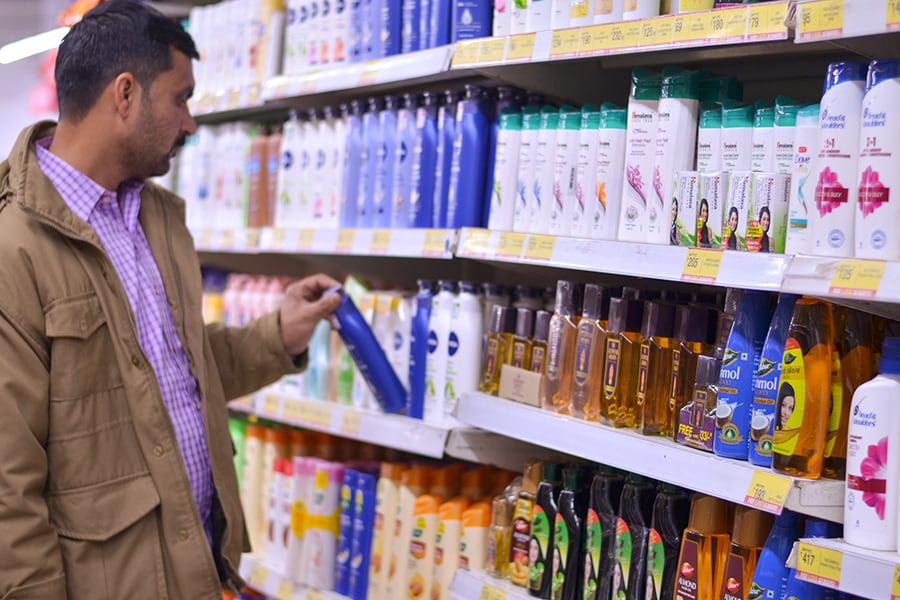Covid-19: The importance of brand recall in mom-and-pop retail
Brand recall creation was a challenge in pre-Covid times too because of the wide range of choices available to consumers of almost all FMCG products


 Image: Shutterstock[br]With nearly 10 million neighbourhood stores dealing in a multitude of FMCG products there is a new challenge that lesser known (low recall) brands are up against in Covid times. It’s called the entry barrier.
Image: Shutterstock[br]With nearly 10 million neighbourhood stores dealing in a multitude of FMCG products there is a new challenge that lesser known (low recall) brands are up against in Covid times. It’s called the entry barrier.
Every small and medium mom-and-pop store has put up entry barriers to their places of business. About six feet from the counter, an airport style rope or chain is installed so that no one can get too close to the shop keeper.
As a customer, if one knows exactly the brands and pack sizes that you need to purchase, then all is well for all three: the purchaser, the shopkeeper and the brand in question. A good brand recall helps the purchaser to not hold up the queue it helps the shopkeeper because fewer trips will have to be made to find the desired product for the forgetful purchaser and good for the brand because in a stressful time such as a pandemic quick brand name recall will help it move off the shelf quickly.
Brand recall is the subjective connect of a brand with its product category. The reason marketers lose sleep over poor brand recall is it can prevent customers from buying instinctively and repeatedly. Brand recall creation was a challenge in pre-Covid times too, because of the wide range of choices available to consumers of almost all FMCG products.
Choice is good. Choice is also stressful. Choices force one to evaluate, compare, consult, think, choose, decide, regret, worry, feel insecure, consume more time, face fear of possible post purchase dissonance and so on. Too many choices actually create anxiety. Strong and positive brand recall helps in reducing this anxiety. Positively and quickly recalled brands can lead to purchase.
In Covid-19 times quick and positive brand recall has important benefits. It reduces proximity and time spent with possible asymptomatic purchasers standing in the queue. As news reports headline the number of Covid-19 cases doubling in shorter cycles, this anxiety is strong. Secondly, weak brand recall would result in the shop personnel inside the store doing more leg work as multiple brands are brought to the front of the store for the customer to decide. Thirdly, with almost no scope for the customer to go inside the store and browse the shelves at least visually, the last mile salesmanship that packaging did for customers by enticing them for new product trial will become weaker. This means that new brands and weak recall brands will have a more difficult time getting into a customer’s zone of consideration. Most will never make it. For example, Parle G owns the glucose biscuit category and Dabur Lal Dantmanjan is king among toothpowders. Fat chance a lesser known brand will have when the customer just wants to complete the buying cycle and get home to safety quickly, when standing in line with other unknown customers, wearing a suffocating mask and wary of handling currency notes or products which might have been handled by many people.
Brand recall is best when it is unaided because it offers a sharp competitive advantage against rivals in tough times such as during the Covid tragedy. When thirsty, Bisleri comes first to mind. Kinley and Aquafina follow behind but do they have as strong an association with water as Bisleri? If not, they will lose in some way during these anxious times. Strong brand recall will aid in reducing decision making time, help in being sure of quality, and create a comforting familiarity of the known. The last is of great significance as Covid-19 has created everywhere a spoken or unspoken fear of the unfamiliar.
So what should marketers do in Covid-19 times? First, get into the consumer’s memory space, dig in and build a fortress there. Well-known brands need to ensure continued positive memory of the brand by maintaining communication channels. Weaker/newer brands need to worm their way in with innovative communication messages and by cutting clutter, helping the customer take a leap of faith when they are at the store front but barred from entering and shopping.
Secondly, marketers could convince and help mom-and-poppers to put up a virtual inventory of the store which can be seen on customers’ mobile phones through a scanned QR store code to assist brand recall. Large brands will have an advantage here owing to their bigger financial muscle power but if marketers could get together to provide this service to customers it would help in creating value by all brands—big and small. Brand recall may become a community effort by different marketers coming together in Covid times.
Thirdly, during the Covid pandemic, field activations (an excellent means of creating brand recall especially in semi-urban and rural areas) would be difficult due to physical distancing requirements. Marketers would have to plan digital (or non-human) activation strategies that are relevant to rural and urban customers differently. Village wells pasted with do’s and don’ts of consuming clean potable water by Bisleri toilets across the country with information by Lifebuoy on the "how" of washing hands and infographics on the dangers of malaria by Goodknight in high incidence areas etc would help in boosting brand recall.
When the customer reaches the kirana store, the decision should be quick and unambiguous. In Covid-19 times, quick, unassisted, positive brand recall will play a key role in customers’ peace of mind.
- By Dr.Jones Mathew, Professor, Great Lakes Institute of Management, Gurgaon
First Published: Jul 17, 2020, 09:46
Subscribe Now